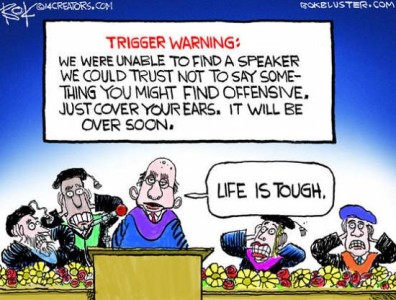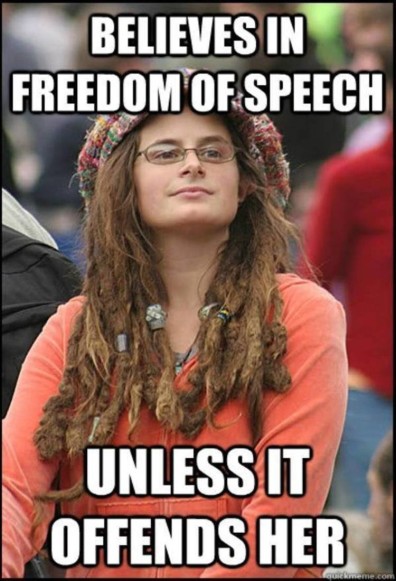Tolerance & Censorship on College Campuses
katy.culleeny
First, I would like to make it very clear that I believe every student should feel safe in their academic environment. I do not intend to discredit the various movements for inclusiveness happening at colleges across the country, or discount the oppression that any student currently feels or has felt in the past. I do not claim to be in any position to say how someone has or has not been affected by attacks on their identity, no matter how subtle, perpetuated by the culture of college campuses, their peers, or society as a whole. That being said, I think that encouraging tolerance on college campuses can in fact cross the line and infringe on peoples first amendment rights. Studies done over the past six decades have repeatedly shown that people are more likely to support free speech when described in abstract terms, but when given specific scenarios, their support for free speech decreases. The problem with that is that the first amendment should be applied in all scenarios in which the speech is protected.
At Wesleyan University, a known liberal campus, students were outraged at an opinion piece published in the school newspaper that criticized some of the tactics, related to the Black Lives Matter movement. The article did not comment on the motivations of the movement. The paper issued an apology after so many people were upset and pledged to provide a “safe space for students of color on campus” but students started a petition and the entire newspaper was ultimately shut down. At Amherst college, students made a list of demands for the school administrators that included punishing students who expressed dissenting opinions- for example, holding signs that said “all lives matter” and that the schools honor code be rewritten to include a zero-tolerance policy for racial insensitivities. If there is anything I’ve learned as a criminal justice student, its that zero tolerance policies can do more harm than good. At a University in California the board of Regents considered implementing a “tolerance policy”. The idea is that students should be “free from acts and expressions of intolerance” while yes, that would be great-universities should not control what their students and faculty say. Nobody should be afraid to speak their mind or express their opinions. Students should not be guaranteed the right to not be offended.
I think these examples illustrate when the demand for tolerance becomes a demand for censorship. Implementing speech codes or tolerance policies, are not the answer. The American Civil Liberties Union, or ACLU, has long protected the rights of free speech, even in defense of bigotry, racism, sexism and homophobia because “free speech rights are indivisible…the same laws or regulations used to silence bigots can be used to silence you”. The ACLU has also spoken specifically against the use of free speech codes on college campuses stating that they “have proven ineffective at best and counter-productive at worst”. Historically, speech codes have even been used against the people they are intended to protect. 
My argument is not against the substance of the protests or the beliefs behind the demands of speech codes and tolerance policies. Nor is my intent to tell people how they should or should not express their beliefs or feelings or further oppress those who are actively speaking out against such oppression. But, in the interest of social change, which I do believe to be the ultimate goal of such protests, there needs to be open debate. As Connor Freidendorf, writer for The Atlantic articulates:
how can one fully understand student activists without attentively listening and then engaging in conversation and, where there is disagreement or lack of clarity, debate? Without a culture of free speech there cannot be constructive dialogue.
This is by no means implying that the burden to engage in debate or encourage public discourse should be put solely on the groups who are protesting. Instead, I believe this is where university administrators should step in. That being said, I do not believe any argument is well-served by attempts to punish or completely block dissenting viewpoints.
I agree with the Supreme Courts’ sentiment that “the proudest boast of our free speech jurisprudence is that we protect the freedom to express ‘the thought that we hate’”. Students of all backgrounds, beliefs, identities and viewpoints should have the freedom to speak their mind and engage in healthy debate and critical thought without facing censorship or oppression. Not only is this the nature of higher learning but it is the more effective method for ensuring long term social change. As supported by cultural cognition, misperceptions of facts surrounding free speech are normal to human cognition
but they should not drive policy. Universities can foster an environment of respect and tolerance by raising awareness, promoting dialogue and speaking against discrimination and bigotry without taking away anyone’s rights. Finally, securing and supporting the right to free speech by speaking against the implementation of speech codes or tolerance policies does not inhibit the discourse on inclusion or marginalization but instead vital too it; “speech codes don’t really serve the interests of persecuted groups. The First Amendment does”.
https://www.washingtonpost.com/news/volokh-%20conspiracy/wp/2015/09/11/university-of-california-considering-recognizing-%20a-%20right-to-be-free-from-expressions-of-intolerance/
http://www.theatlantic.com/politics/archive/2015/12/what-student-activists-can-learn-from-bygone-free-speech-fights/419178/
http://www.theatlantic.com/politics/archive/2015/10/the-anti-free-speech-movement-at-ucla/410638/
http://www.theatlantic.com/politics/archive/2015/11/how-campus-activists-are-weaponizing-the-safe-space/415080/#article-comments
http://www.theatlantic.com/politics/archive/2015/11/the-new-intolerance-of-student-activism-at-yale/414810/
https://www.aclu.org/hate-speech-campus